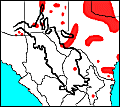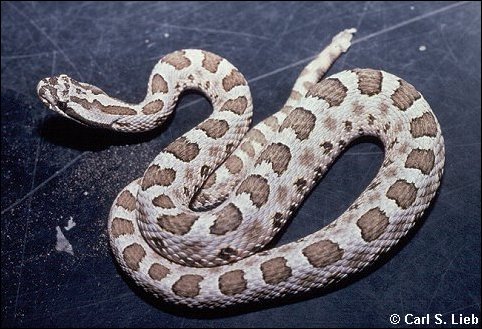


Sistrurus catenatus. Photographer: Dr. Carl S. Lieb. Socorro Co., NM. 19 June 1995.
Adult length is 16-40.5 in. (40-100 cm). The dorsal pattern is similar to that of the Prairie (Western) rattlesnake, with dark brown blotches that stand in contrast to the usually gray or tan-gray ground color. However, there are nine large scale plates on the crown of the head and the rattle is very small compared to that of other regional rattlesnakes. Broad dark eyestripe is present, and the underside of the snake is pale and usually unmarked in western specimens.
Central New York and southern Ontario, continuing diagonally across the U.S. to extreme southeastern Arizona and Gulf Coast of Texas. Sea level to around 5500 ft. (1680 m). Rare and spottily distributed in the El Paso region, with historically known populations north and northwest of Las Cruces in New Mexico.
Often called the "swamp rattler" of the eastern U.S., this snake occurs from desert grasslands to river bottoms and swamps. In the western U.S., it seems to favor desert grasslands and prairies with deep sandy soils.
The Massasauga feeds mostly on mammals (mice, rats, squirrels), but will also consume lizards, snakes, and amphibians.
Live-bearing. Birth usually occurs from July-September, with brood size averaging 2-19. Newborn are generally 7-9.5 in. (18-24 cm) in length.
Kinniburgh, R. M. 1972. Distribution of Thermal Responses of the Rattlesnake (Genus Crotalus) in El Paso County, Texas. University of Texas at El Paso.
Klauber, L. M. 1982. Rattlesnakes. University of California Press, Berkeley.
Stebbins, R. C. 1985. A Field Guide to Western Reptiles and Amphibians. Houghton Mifflin Company, Boston.
Tennant, A. 1985. A Field Guide to Texas Snakes. Texas Monthly Press, Hong Kong.
William D. Beltran, July 1997.
Last Update: 11 Jul 2009